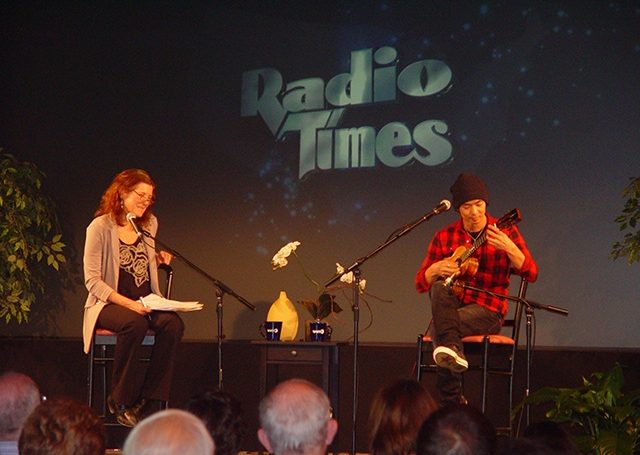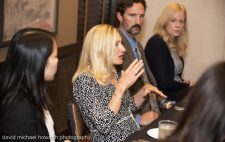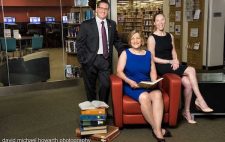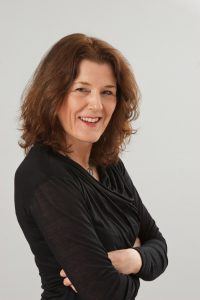 The broadcast veteran has seen – and heard – it all on WHYY’s “Radio Times”
The broadcast veteran has seen – and heard – it all on WHYY’s “Radio Times”
Marty Moss-Coane might be the only person in the world to have interviewed former Secretary of State Madeleine Albright and Pulitzer Prize-winning novelist Toni Morrison on the same show.
“In terms of a total girl-power two hours, that certainly fit the bill,” says Moss-Coane, 69. “It was fun to talk to powerful women about their lives. As their paths crossed, they gave each other a big hug.”
Powerful and interesting guests have become the norm during Moss-Coane’s 30-year stint as the host of the talk show “Radio Times” on WHYY-FM (90.9). Her thought-provoking mix of interviews with newsmakers and talks with artists and authors have made the show a staple every weekday, as well as with podcast listeners.
Some of her most popular – and favorite – interviews include British novelist Salman Rushdie, who Moss-Coane says is “an excellent conversationalist,” and children’s book author and illustrator Maurice Sendak.
Moss-Coane was thrilled to lend a voice to the monsters when Sendak read his classic children’s story “Where the Wild Things Are” aloud on the radio. “Apparently, he rarely ever did this, so I must have gotten him on a good day,” she says.
Radio Times’ call-in feature and in-studio guests require Moss-Coane to be prepared for anything, and she equates the live show to theater. Her unflappable on-air presence stems from the hours she spends researching upcoming guests (she always reads authors’ books before they appear on her show) and doing her homework on complicated subjects ranging from politics and the Middle East to school shootings and gun laws.
“My producers and I can check people out and hear what they sound like by checking out other interviews. You can go on YouTube and hear them giving a speech,” she says.
Though Moss-Coane has a special knack for getting her interview subjects to talk, her radio career happened somewhat accidentally. After graduating from Temple University, she became a social worker in Philadelphia. The emotional nature of the job took a toll on her, and her mother encouraged her to volunteer at WHYY.
She credits much of her professional success to her mentor, WHYY station manager Bill Siemering, who helped Moss-Coane early in her career.
“Having someone who both kicks your butt but also sees things in you that you haven’t seen or didn’t even know existed in yourself has been really important to me,” the broadcast veteran says. “We all need somebody that shows us the way but also holds us to higher standards.”
Surprisingly, Moss-Coane doesn’t have a bucket list of people she still wants to interview. “After 30 years, I’ve learned that the guests I really like are the ones I’ve never heard of,” she says. “Sometimes it’s the person just beginning their career that no one knows about – that I didn’t even know about – who turns out to be interesting. Then I get the pleasure over time of watching their career take off. It feels almost maternal, in a way.”
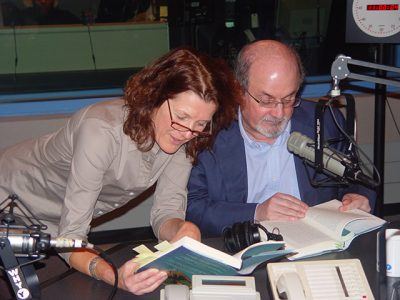
Moss-Coane reads with Salman Rushdie
She still cringes at the interviews that didn’t turn out the way she had hoped or expected. Carl Bernstein, the investigative journalist who may be best known for covering the Watergate scandal, immediately comes to mind.
“It was when he wrote his book about Hilary Clinton,” she recalls. “The book had gotten really nice reviews. I was interested in talking to him, and Clinton was certainly an interesting person to talk about.”
But Moss-Coane was dismayed to discover what a “control freak” Bernstein was. “He wanted me to basically promote him on the air and say how great all the reviews were, to kowtow to him. I wasn’t having any parts of that. That’s not my job to do that. We had this feisty back-and-forth interview that was tense and ugly at moments, and certainly not fun. When the interview was over he said, ‘You’re a terrible interviewer,’ and I said, ‘And you’re a terrible guest.’”
Though most interviews fare much better, Moss-Coane says she certainly isn’t a stranger to criticism. “I’ve always saved my hate mail, because it’s interesting to see what people get upset about,” she says.
For her show’s 30th anniversary, she had the comedy theater group 1812 Productions put those nasty missives to good use, reading the letters aloud.
Putting a comedic, dramatic spin to everything from Moss-Coane’s imperfect pronunciation when saying “Pennsylvania” – apparently she leaves out the “l” – to her overuse of the word “but” to her “distracting stammer.”
“I loved every moment of it,” she says. “It’s this window into how people connect or don’t connect with an invisible person they hear on the radio. There were also ones that were not funny, very disturbing, that you wouldn’t want to share with other people.”
Admittedly, Moss-Coane takes some of the criticism to heart, though she says she’s developed thicker skin over the years.
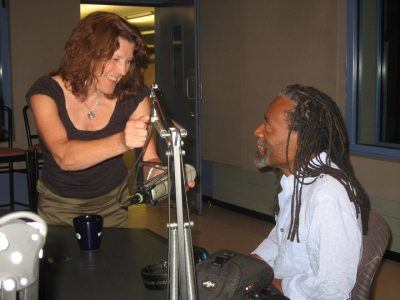
Marty Moss-Coane prepares to interview Bobby McFerrin
“I’m not a perfect interviewer, and I certainly have my bad days,” she says. “If someone says, ‘You really missed it here’ or ‘Why didn’t you ask that?’ or ‘You didn’t pronounce Pennsylvania correctly,’ sometimes they’re correct – in which case I write back and say, ‘You are absolutely correct, thanks for pointing it out.’”
After 30 years in the business, Moss-Coane says her biggest challenge is burnout. “Because it’s a live show and we deal a lot with politics, you can just feel the anger, finger pointing and hatefulness that’s there sometimes,” she says. “I get this outlet to talk about it, so in certain ways I can let it out, but at the same time, I feel like a lot of people do: in the thick of very fraught and angry times.”
“Do we have leaders who can lead us through this so we can come to some kind of resolution, or are we just going to be a country who is at each other’s throats for the next generation or two? It’s feeling the burnout and frustration. I believe in solutions journalism. Somehow, we have to come to some kind of solution. It’s unnerving and very worrisome the state we’re in as a country as a whole.”


